
Otto Abels Harbach, born Otto Abels Hauerbach was an American lyricist and librettist of nearly 50 musical comedies and operettas. Harbach collaborated as lyricist or librettist with many of the leading Broadway composers of the early 20th century, including Jerome Kern, Louis Hirsch, Herbert Stothart, Vincent Youmans, George Gershwin, and Sigmund Romberg. Harbach believed that music, lyrics, and story should be closely connected, and, as Oscar Hammerstein II's mentor, he encouraged Hammerstein to write musicals in this manner. Harbach is considered one of the first great Broadway lyricists, and he helped raise the status of the lyricist in an age more concerned with music, spectacle, and stars. Some of his more famous lyrics are "Smoke Gets in Your Eyes", "Indian Love Call" and "Cuddle up a Little Closer, Lovey Mine".

Jean Schwartz was a Hungarian-born Jewish American composer and pianist. He is best known for his work writing the scores for more than 30 Broadway musicals, and for his creation of more than 1,000 popular songs with the lyricist William Jerome. Schwartz and Jerome also performed together on the vaudeville stage in the United States; sometimes in collaboration with Maude Nugent, Jerome's wife, and the Dolly Sisters. Schwartz was married to Jenny Dolly from 1913 to 1921.

Sigmund Romberg was a Hungarian-born American composer. He is best known for his musicals and operettas, particularly The Student Prince (1924), The Desert Song (1926) and The New Moon (1928).
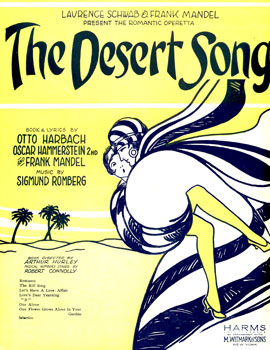
The Desert Song is an operetta with music by Sigmund Romberg and book and lyrics by Oscar Hammerstein II, Otto Harbach and Frank Mandel. It was inspired by the 1925 uprising of the Riffs, a group of Berber fighters, against French colonial rule in Morocco. It was also inspired by stories of Lawrence of Arabia aiding native guerrillas. Many tales romanticizing Saharan North Africa were in vogue, including Beau Geste and The Son of the Sheik.

Little Mary Sunshine is a musical that parodies old-fashioned operettas and musicals. The book, music, and lyrics are by Rick Besoyan. The original Off-Broadway production premiered November 18, 1959 at the Orpheum Theatre in New York City's East Village. Staying in the neighborhood, it moved to the Player's Theatre on June 21, 1961, then, finally, to the Cherry Lane Theatre on March 21, 1962. Closing was Sept. 2, 1962. Combined run was 1,143 performances. It was seen briefly in a West End production in 1962 and has become a popular show for amateur and semi-professional groups in the United States and elsewhere.
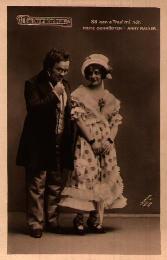
Das Dreimäderlhaus, adapted into English-language versions as Blossom Time and Lilac Time, is a Viennese pastiche operetta with music by Franz Schubert, rearranged by Heinrich Berté (1857–1924), and a libretto by Alfred Maria Willner and Heinz Reichert. The work gives a fictionalized account of Schubert's romantic life, and the story was adapted from the 1912 novel Schwammerl by Rudolf Hans Bartsch (1873–1952). Originally the score was mostly Berté, with just one piece of Schubert's, but the producers required Berté to discard his score and create a pasticcio of Schubert music.
Henry Martyn Blossom Jr. was an American writer, playwright, novelist, opera librettist, and lyricist. He first gained wide attention for his second novel, Checkers: A Hard Luck Story (1896), which was successfully adapted by Blossom into a 1903 Broadway play, Checkers. It was Blossom's first stage work and his first critical success in the theatre. The play in turn was adapted by others creatives into two silent films, one in 1913 and the other in 1919, and the play was the basis for the 1920 Broadway musical Honey Girl. Checkers was soon followed by Blossom's first critical success as a lyricist, the comic opera The Yankee Consul (1903), on which he collaborated with fellow Saint Louis resident and composer Alfred G. Robyn. This work was also adapted into a silent film in 1921. He later collaborated with Robyn again; writing the book and lyrics for their 1912 musical All for the Ladies.
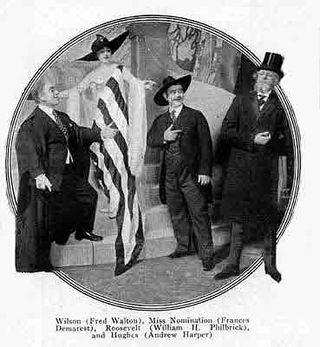
The Passing Show of 1916 is a revue featuring the music of Sigmund Romberg and Otto Motzan, with book and lyrics by Harold Atteridge. It included the first George Gershwin songs introduced in a Broadway show.
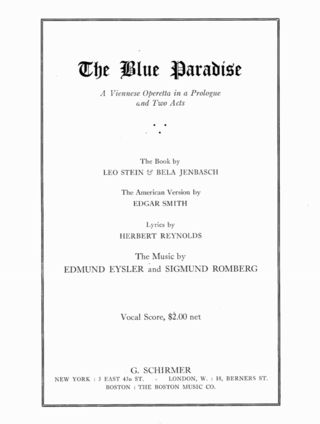
The Blue Paradise is a musical in a prologue and two acts, with music by Edmund Eysler, Sigmund Romberg and Leo Edwards, lyrics primarily by Herbert Reynolds, and a book by Edgar Smith, based on the operetta Ein Tag im Paradies by Eysler with original text by Leo Stein and Bela Jenbach. The story is set in a Viennese cafe, where a man realizes that he cannot recapture his long lost love.

Maytime is a musical with music by Sigmund Romberg and lyrics and book by Rida Johnson Young, and with additional lyrics by Cyrus Wood. The story is based on the 1913 German operetta Wie einst im Mai, composed by Walter Kollo, with words by Rudolf Bernauer and Rudolph Schanzer. The story, set in New York, is told in episodes covering a long period, from 1840 to the 20th century. Wealthy young Ottillie is in love with Dick, but they are kept apart by family and circumstance. Years later, their descendants marry. Maytime introduced songs such as "The Road to Paradise", "Will You Remember?" and "Jump Jim Crow".
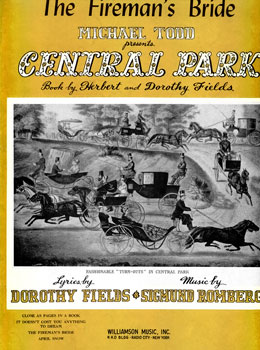
Up in Central Park is a Broadway musical with a book by Herbert Fields and Dorothy Fields, lyrics by Dorothy Fields, and music by Sigmund Romberg. The musical, originally called "Central Park" before Broadway, was Romberg's last stage work produced during his lifetime.

Bombo is a Broadway musical with a book and lyrics by Harold Atteridge and music by Sigmund Romberg.
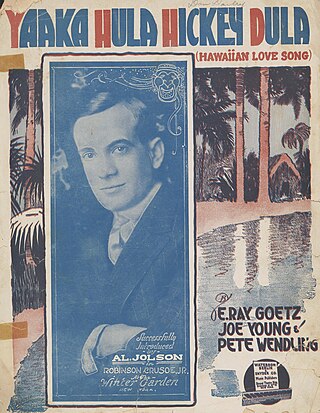
Robinson Crusoe, Jr. is a musical with a book by Edgar Smith, lyrics by Harold Atteridge, and music by Sigmund Romberg and James Hanley.

La La Lucille is a musical with a book by Fred Jackson, primary lyrics by Arthur J. Jackson and Buddy DeSylva, additional lyrics by Lou Paley and Irving Caesar, and music by George Gershwin.
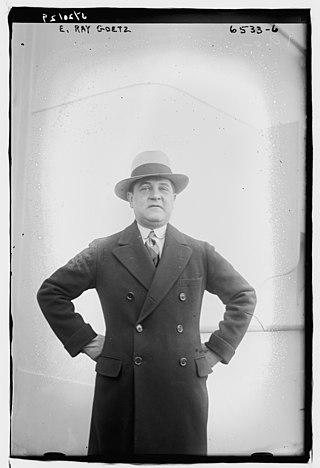
Edward Ray Goetz was an American composer, lyricist, playwright, theatre director, and theatrical producer. A Tin Pan Alley songwriter, he published more than 500 songs during his career, many of them originally written for the New York stage. His songs were recorded by several artists, including Judy Garland, Al Jolson, and Blossom Seeley. He was active as both a lyricist and composer for Broadway musicals from 1906 through to 1930, collaborating with artists like George Gershwin, Cole Porter, Sigmund Romberg, and A. Baldwin Sloane to create material for the theatre.
A lovebird is a parrot native to Africa.

Edgar Allan Woolf was an American lyricist, playwright, and screenwriter. He is best known as the co-author of the script for the 1939 film The Wizard of Oz.
Jesse C. Huffman (1869–1935) was an American theatrical director. Between 1906 and 1932 he directed or staged over 200 shows, mostly for the Shubert Brothers. Many of them were musical revues, musicals or operettas. He is known for The Passing Show series of revues that he staged from 1914 to 1924 at the Winter Garden Theatre on Broadway, daring alternatives to the Ziegfeld Follies.
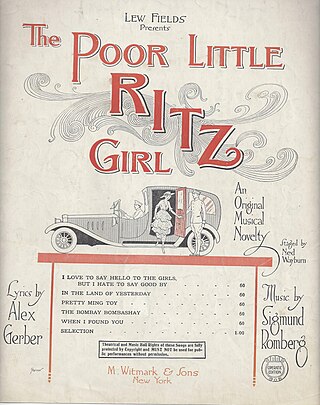
Poor Little Ritz Girl is a musical comedy in two acts, with book by George Campbell and Lew Fields. The show had some songs with lyrics by Alex Gerber and music by Sigmund Romberg and other songs with lyrics by Lorenz Hart and music by Richard Rodgers. The show was produced by Lew Fields at the Central Theatre. It opened on July 28, 1920.

Evelyn Cavanaugh was an American actress, singer, and dancer in Broadway musical comedies in the 1910s and 1920s.

















